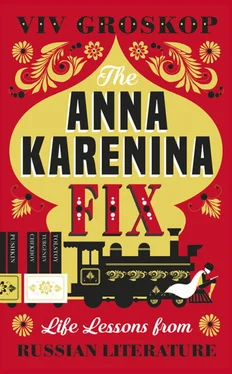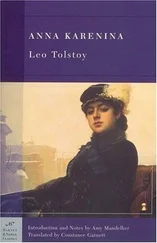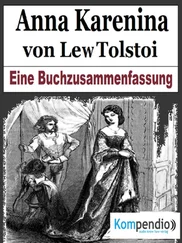Chichikov is supposed to be a dreadful person, someone who eats three pancakes in a stack, rolled up and dipped in melted butter. The monster. But really, what’s not to like about a man who wears a tailcoat of whortleberry-red hue shot through with a lighter weave? (Imagine the poor translator who had to get all that right. Whortleberry red? This jolly fruit is a sort of lingonberry, apparently. Heaven forbid Gogol should just say it’s a scarlet or crimson jacket.) He covers up this delightful piece of attire with ‘a greatcoat lined with bearskin’. That is some greatcoat. This is typical Gogol: detail, artifice, dandyism, fun. But always with a wink. Chichikov isn’t really well dressed. He’s wearing the emperor’s new clothes. Gogol has a wonderful eye for detail and a lovely way of describing small moments. When Chichikov visits a landowner, the narrator takes it upon himself to describe the landowner’s relationship with his wife: ‘They would plant such a long and languorous kiss on each other that, for its duration, a small cheap cigar could easily have been smoked to the end.’ Just as the greatcoat has got to be lined with no less than bearskin, that really does have to be an extremely long kiss. Gogol is not someone who likes to do things by halves. He is someone who is a consummate observer of others: their mannerisms, behaviour, speech patterns. These people are here because we need them for the story – and because they’re funny. But they’re also here to remind us that at least we’re not as bad as everyone else.
Dead Souls is a highly effective cautionary tale about the perils of hypocrisy. Chichikov is a ridiculous character, but he is in many ways a likeable one. He’s foppish and charmingly dressed. He is garrulous and has a turn of phrase that makes him seem attractive and entertaining at times. He has an irritatingly high regard for his own face and loves his chin so much that he strokes it as often as possible and likes to boast to his friends how perfectly round it is. (Hey, if I had a perfectly round chin, I would also do this.) He likes blowing his nose very loudly into a white handkerchief infused with eau de cologne, making a sound that is not unlike a trumpet blowing in your ear. This is described as being all rather fun and amusing. As readers, we need to see him this way because, otherwise, the book would not work: we wouldn’t believe that the landowners would be deceived by his charm and hand over their dead souls. This is Gogol showing us what we should be really careful of. Hypocrites, con men and shysters are charismatic and damn good company.
Just before Chichikov realizes that he has now obtained almost four hundred souls, Gogol allows the narrator a digression that gives some insight into the message he was trying to impart with this work, which we have to suppose he would have fleshed out more fully if he had got to the end of the intended three parts. The narrator imagines a writer who is truly happy because he tells tales of heroic types who never put a foot wrong, who achieve fame far and wide and never descend to the depths of the ordinary life. But he is not this kind of writer, he adds. He is instead the sort who seeks to ‘summon forth… all the dreadful, appalling morass of trifles that mire our lives…’ This is the writer who shows the ugly truth and whom no one appreciates. Not for him the praise of his readers or the admiration of sixteen-year-old girl fans who will fly at him, ‘head awhirl and hero-worshipful’. He continues to heap on the self-pity. This writer will never be acclaimed in his lifetime. The importance of the honesty of his work will never be understood. He will experience ‘reproach’ and ‘ridicule’. This was true of Gogol, who received stern criticism in his time. ‘Harsh is his chosen course,’ the ‘narrator’ (i.e. Gogol himself) concludes, ‘and bitterly will he feel his solitude.’ Honesty is important and noble. But it will not necessarily make you liked.
What’s cheering about Dead Souls is not only that Gogol is so funny, it’s that you can tell he can’t quite help loving the people he purports to hate, just a little bit. The novel is full of digressions designed to showcase the local characters Chichikov encounters on his travels, each one more ridiculous, pompous and self-deluded than the last. Could he show us any more clearly how we should not be behaving? One of my favourite portraits is that of the virtually comatose landowner Andrey Ivanovich Tentetnikov in Chapter 1 of Part 2, a character who has caused no end of headaches to translators. In one edition, he comes across as a romantic type: ‘…he was not a bad person, he was simply a star-gazer’. But this isn’t meant as a compliment. Other translations read differently: ‘neither a good nor a bad being, but simply – a burner of the daylight’ (Pevear and Volokhonsky translation). And this: ‘a fellow crawling between earth and heaven’ (Guerney and Fusso translation). All Gogol means is that this man is a layabout, a good-for-nothing, a lazybones, an idler. He makes this very clear by the end of the section: ‘…Tentetnikov belonged to that species of people who are in no danger of becoming extinct in Russia, and who formerly bore such names as sluggards, lieabouts and couch-warmers’. These are exactly the people Gogol wants to skewer in this book. And yet, boy, does he make them seem amusing.
Things go badly for Tentetnikov after an altercation with the General, whose daughter he hoped to court. Tentetnikov gets fed up with the General referring to him in conversation as ‘my friend’ and ‘my very dear fellow’, as he thinks it’s overfamiliar and patronizing. When the General finally uses ty instead of vy for ‘you’ to him (like tu and vous in French), Tentetnikov loses it completely and breaks off from the family. In the aftermath of this event, he becomes even more slothful and couch-warming than usual: ‘His pantaloons even found their way into the parlour. On the elegant table in front of the sofa lay a pair of greasy braces, as if they had been set out as a refreshment for a guest.’ (Only Gogol the gourmand could see a pair of braces on a table as looking like they’d been presented as a snack.) This is the moment when Chichikov enters the poor man’s life, seeking someone new to scam. Tentetnikov becomes the catalyst for Chichikov’s second adventure, when he convinces Chichikov to talk to the General on his behalf to repair relations between the two of them.
Tentetnikov, like dozens of other characters, is the embodiment of poshlost’ , the fascinating Russian characteristic most closely associated with Gogol. Known as a virtually untranslatable word (and we all know how much I hate that idea), it means something like ‘trashiness’, ‘tackiness’, ‘vulgarity’, ‘triviality’. It has a moral weight to it: once you have succumbed to poshlost’ as an individual, your life is worthless. Nabokov defined it as ‘the falsely important, the falsely beautiful, the falsely clever, the falsely attractive’. Sometimes, I wish Nabokov were still alive so that he could meet the Kardashians. The idea of hypocrisy is wrapped up in there, too. Gogol’s job in Dead Souls is to show us that these people may believe themselves to be important and significant but, in fact, they are anything but. Someone who is poshliy (the adjective from the noun) doesn’t know it; otherwise, they would stop themselves. Gogol evokes poshlost’ at every turn, but he does it in such a way that you feel as though he loves these people, too. It’s as if he can’t quite bring himself to condemn them. Or perhaps it’s just that he’s brought these characters to life too vividly and so it’s too easy to identify with them. (Or maybe I am just poshlaya and so I identify with the trash. This is very possible.)
Читать дальше












